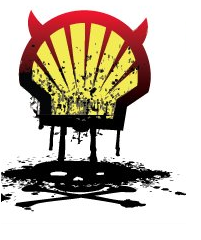|
UK Tar Sands Network, Indigenous Environmental Network, Athabasca Chipewyan First Nation (ACFN), Women of Africa, Platform, Rising Tide UK, FairPensions, Greenpeace, Shell to Sea, Climate Rush, Art Not Oil, Rossport Solidarity Camp present:Get The Shell Out!18th May 2012, Toynbee Hall, 7.30pm
 You are warmly invited to a public meeting in advance of Shell’s AGM, that will bring together a diverse coalition of individuals and organisations calling Shell to account for the social and environmental impacts of its activities around the world. You are warmly invited to a public meeting in advance of Shell’s AGM, that will bring together a diverse coalition of individuals and organisations calling Shell to account for the social and environmental impacts of its activities around the world.
Millions are being affected by Shell’s past, present and future operations. The world’s largest oil company has been violating indigenous rights for 55 years in the Alberta tar sands, committing grave human rights abuses in Nigeria, pumping dangerous levels of greenhouse gases into the atmosphere, destroying communities in Ireland, lobbying against effective climate action in Europe and is now set to exploit the Arctic – which could devastate the world’s most fragile ecosystem.
Come and hear stories from community members on the frontline in Alberta, Alaska, Ireland and Nigeria, share ideas and information, and meet activists, academics, lawyers and investors united in their resolve to curb the oil giant’s destructive activities.
Speakers include - Eriel Tchekwie Deranger, ACFN Tar Sands Communications Coordinator Athabasca Chipewyan First Nation
- Alice Ukoko, Women of Africa
- Robert Thompson, Chairman of REDOIL & Inupiat resident of Kaktovik
- Ben Powless, Indigenous Environmental Network
- Ron Plain, Aamjiwnaang First Nation
- Shell to Sea/Rossport Solidarity Campaign TBA
|
|
|
|
Athabasca Chipewyan First Nation representative join other Indigenous Peoples from Canada, Alaska and Nigeria to criticize Shell for environmental destruction and human rights abuses
Report to be launched in London on Friday at public meeting before delegation travels to The Hague for AGM next week
London, UK – This Friday 18th May the Indigenous Environmental Network in partnership with Athabasca Chipewyan First Nation are launching an Indigenous-led campaign and report against Shell and its harmful projects. A delegation of four Indigenous people[1] from North America will participate in the public launch of a report profiling the British-Dutch company’s increasing involvement in the world’s dirtiest and riskiest energy projects. The groups are working in solidarity with Indigenous communities in Nigeria to stop Shell’s plans to expand tar sands oil, Arctic drilling and refinery operations on Indigenous lands across North America.
The Athabasca Chipewyan First Nation made headlines in 2011 by filing suit suing the oil giant for failure to meet past agreements made between Shell and the First Nation regarding existing tar sands projects within ACFN traditional territory and Canada’s pristine Athabasca watershed. Now, the First Nation is aggressively opposing Shell’s future tar sands projects in their traditional territory in Northern Alberta including a proposed project in the pristine wilderness of the Pierre River, a previously untouched area.
The new report being launched in London, entitled “Risking Ruin: Shell’s dangerous developments in the Tar Sands, Arctic and Nigeria”[3] profiles Indigenous communities impacted by Shell’s operations in Canada’s Alberta Tar Sands, Alaska’s Arctic Ocean, Ontario’s Aamjiwnaang First Nation and Africa’s Niger Delta. It argues that the impacts of Shell’s destructive activities outweigh the benefits and expose the company to both reputational damage and political risk, including litigation.
Eriel Deranger, a community member and appointed spokesperson for the Athabasca Chipewyan First Nation in the UK and the Hague[4], stated, “This new report highlights the dangers our community could face if we don’t protect our rights and land. We don’t want our community to become the next Niger Delta—where Shell’s unregulated actions have left communities devastated and resulted in the need for a 30-year clean-up estimated to cost $1 billion USD.”
Eriel Deranger will continue traveling with the delegation to attend Shell’s Annual General Meeting in The Hague, Netherlands, on 22nd May 2012, where they will present to the Chairman and Board about the human and ecological rights violations the company’s operations have brought to the community. Other UK activist groups, including UK Tar Sands Network and London Rising Tide will be in attendance at the AGM to protest the oil giant both in Hague and London, UK via satellite AGM in the Barbican Centre.
|
|
|
|
We have set up a Pay Pal donation page. A secure and easy to use application.
You can use your credit, debit, checking or Pay Pal account (if you have one) to donate $3, $5 or more dollars.
Don't wait please - do it today - your gifts, along with others will ensure that we can continue to work for YOU and the future of our next Seven Generations! |
|
| Shell under fire from Indigenous Peoples over human rights abuses and environmental destruction in Canada, Alaska and Nigeria |
| For immediate release: 17.5.2012
Report to be launched in London on Friday at a public meeting before the delegation travels to The Hague for next week's Annual General Meeting of Royal Dutch Shell.
London, UK – This Friday, May 18th, the Indigenous Environmental Network in partnership with Athabasca Chipewyan First Nation are launching an Indigenous-led campaign against Shell and its harmful projects. A delegation of four Indigenous peoples [1] from North America will participate in the public launch of a report profiling the British-Dutch company’s increasing involvement in the world’s dirtiest and riskiest energy projects.
The launch event, ‘Get the Shell Out’ [2], is taking place at 7.30pm at Toynbee Hall, East London, with opportunities from 6.30pm for media interviews. It is co-hosted by a coalition of organizations which also includes UK Tar Sands Network, Women of Africa, Platform, Rising Tide UK, FairPensions, Greenpeace, Shell to Sea, Climate Rush, Art Not Oil and the Rossport Solidarity Camp.
The new report, entitled “Risking Ruin: Shell’s dangerous developments in the Tar Sands, Arctic and Nigeria” [3] profiles Indigenous communities impacted by Shell’s operations in Canada’s Alberta Tar Sands, Aamjiwnaang First Nation’s territory in Ontario, Alaska’s Arctic Ocean and Africa’s Niger Delta. It argues that the impacts of Shell’s destructive activities outweigh the benefits and expose the company to both reputation damage and political risk, including litigation.
The delegation will then attend Shell’s Annual General Meeting in The Hague, Netherlands, on 22nd May, where they will confront the Chairman and Board over the massive human and ecological rights violations and economic devastation that the company’s operations have brought to local communities. There will also be a simultaneous creative protest by UK activist groups, including UK Tar Sands Network and London Rising Tide, at Shell’s satellite AGM in the Barbican Centre on May 22nd. Read more now. |
|
|
|
|
|
Ben Powless is a Mohawk citizen from Six Nations in Ontario, currently living in Ottawa, Canada. He has recently completed an interdisciplinary degree in Human Rights, Indigenous and Environmental Studies at Carleton University in Ottawa with an Honours Research Paper on the subject of Indigenous Peoples and Climate Change. He works mostly with the Indigenous Environmental Network (www.ienearth.org), focused on climate justice and resource extraction in Indigenous territories, particularly the tar sands in Canada. He is also an organizer with the Defenders of the Land network, a national Indigenous network. He has spent time working in Mexico, Guatemala, Nicaragua and Peru on human rights and environmental issues.
 Eriel Tchekwie Deranger is a Dene Indigenous activist and member of the Athbasca Chipewyan First Nation of Northern (ACFN) Alberta, Canada. ACFN is home to ground zero for tar sands extraction in Alberta. Eriel is currently working for her First Nation leadership as a campaign and communication coordinator challenging current and proposed projects of Shell Canada in Alberta's Tar Sands. Shell is currently one of the largest operators in the tar sands with newly proposed projects that would infringe on ACFN's traditionally territory and contributed to further erosion of the fragile eco-systems, critical wildlife habitat, and Indigenous territory in Northern Alberta. ACFN has currently sued Shell for unmet past agreements and is challenging the permits for two new projects. Eriel is a long time Indigenous rights activist fighting for environmental justice working along side various organizations. Eriel’s activism has led her to international levels where she has worked with groups and institutions such as International Indian Treaty Council, TakingItGlobal, Canadian Heritage, the United Nations, Indigenous Environmental Network, Ruckus and IP3. She has extensive experience and a deep rooted understanding of International Indigenous rights obtain through the International Training Centre for Indigenous People in Illuslisat, Greenland and her work at a Treaty Land Entitlement and Specific Land Claims researcher for the Federation of Saskatchewan Indian Nations. Eriel is currently working along side numerous allies to create awareness about the negative climate and human rights impacts of the Alberta Tar Sands and demanding full recognition of Indigenous rights from all levels of permitting and development in Indigenous territory.
Ron Plain: In the last 10 years, Ron has turned the focus of his activism to the Native rights, both Inherent and Treaty as they pertain to the holistic view of environment and health. An Aanishinaabe man from Aamjiwnaang in southern Ontario, (called the Most Polluted Spot in North America by National Geographic Staff and found to have the most contaminated air shed by the World Health Organization), Ron became active in protecting the health of his family, his community.
Ron formed a community environment committee that eventually became a standing committee of Aamjiwnaang Chief and Council. As Chair of this committee Ron steered the committee and community into international media attention. Aamjiwnaang and Sarnia’s Chemical Valley have been the focus of 11 documentaries and feature length news pieces, Men’s Health Magazine, Chatelaine Magazine, numerous print media features and CNN, to name a few.
Robert Thompson: Mr. Thompson was born in Fairbanks, Alaska and is Inupiat who resides in the community of Kaktovik, Alaska. Mr. Thompson has been actively involved with numerous organizations whose purposes are to inform, educate and benefit indigenous peoples. Mr Thompson currently serves as the Chairman of Resisting Environmental Destruction on Indigenous Lands (REDOIL) which is a movement of Alaska Natives of the Inupiat, Yupik, Aleut, Tlingit, Eyak, Gwich’in and Denaiana Athabascan Tribes who are challenging the oil and mining industries and demanding their rights to a safe and healthy environment conducive to subsistence. REDOIL aims to address the human and ecological health impacts brought on by unsustainable development practices of the fossil fuel and mineral industries, and the ensuing effect of catastrophic climate change. |
|
|
No comments:
Post a Comment
I have a few simple comment rules:
(a) No
1. rudeness
2. falsehood
3. deception
4. unfair tactics
5. comment spam
6. shilling or trolling
(b) stay on topic; and
(c) anonymous comments are okay, but sign with a handle so we'll know which "Anonymous" you are.
Thanks for commenting.
Ray